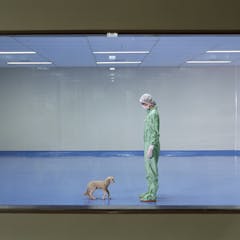
Articles on Science research
Displaying 1 - 20 of 31 articles

A deal that avoided a shutdown also slashed spending for the National Science Foundation, putting it billions below a congressional target intended to supercharge American science research.

Visualization is an essential part of the scientific process. Advances in imaging have enabled eye-opening discoveries, not only for scientists and researchers but also for the general public.

Guidelines and regulations weigh the medical and health benefits of animal research with researchers’ ability to ensure humane care of their subjects from start to finish.

The South African Khoe-San communities are no strangers to exploitative research. One research team is trying to provide genetic ancestry results to community members. But they still face many challenges.

Seventeen prizes were awarded in this year’s ceremony, recognising a diverse group of scientific minds devoted to solving key 21st century issues.

The winner of the 2018 Nobel Prize in physics says scientists shouldn’t feel pressured to do research that has economic or commercial ramifications. Science for the sake of science is more important.

In an era of big scientific collaborations, China’s renegade actions have hurt its reputation. As international researchers back away, it may be the country’s military that ultimately suffers.

Money always seems tight for university scientists. A sociologist conducted hundreds of interviews to see how they think about funding sources and profit motives for basic and applied research.

Science can’t just stay in the ivory tower. But what does impact really mean and how does it happen? A study of more than a decade of ecological fieldwork projects in Bolivia suggests a better way.

The only place to find the Golden Age of Science is in the future, but we need some help in getting there.

Scientists are rewarded with funding and publications when they come up with innovative findings. But in the midst of a ‘reproducibility crisis,’ being new isn’t the only thing to value about research.

President Trump’s first year was a rough one for scientists and others who value truth and expertise. Many rallied to the cause, while others used research to make the case for the value of science.

Science isn’t cold, hard facts uncovered by emotionless robots. Acknowledging how and where values play a role promotes a more realistic view and can advance science’s reputation for reliability.

Research dollars don’t stay locked up in academia and government labs. R&D collaborations with the private sector are common – and grow the innovation economy.

A team of archaeologists strived to improve the reproducibility of their results, influencing their choices in the field, in the lab and during data analysis.

Any field that collects and analyzes data relies on statistical techniques to make sense of it all. Modern, more accurate methods should supplant the old ways… but in many cases, they haven’t yet.

The research community tends to assume advocacy doesn’t mix with objectivity. One study suggests there’s room for scientists to make real-world recommendations without compromising their trusted status.

What are research dollars actually spent on? Rather than looking at artifacts like publications and patents, a new initiative directly tracks the people and businesses that receive research funding.

In science, the word ‘theory’ has a very specific meaning that’s easy for nonscientists to misunderstand or misconstrue. Here’s what a theory must withstand to be accepted by the scientific community.

The priorities of science are being influenced less by government policy and academia, and more by the priorities of the philanthropic giver.

